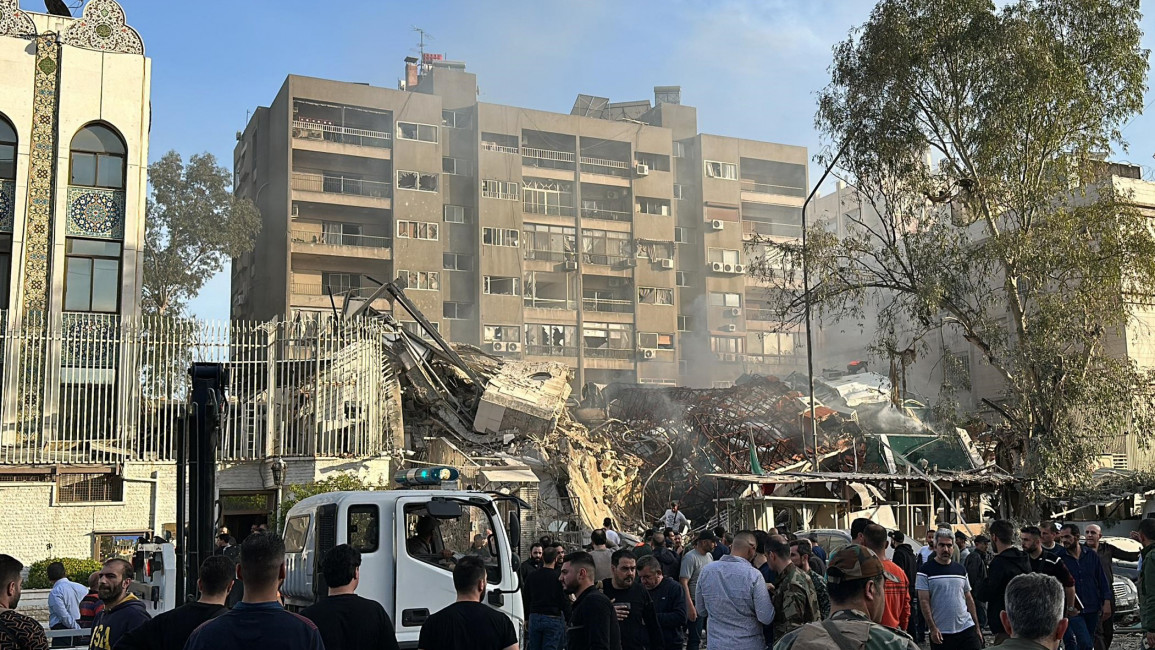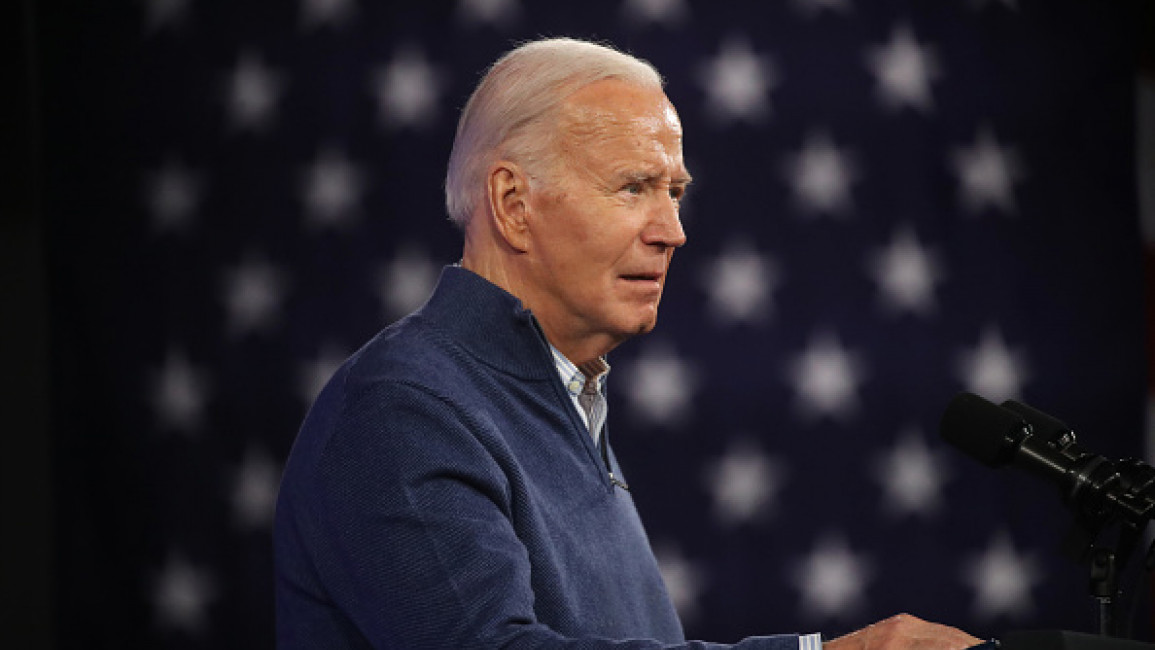
Why Iran attacked Israel and what could happen next

The Iranian-Israeli ‘shadow war’ ended on 13 April with Iran firing 170 drones and 150 cruise and ballistic missiles at Israel from Iranian soil.
This was the Islamic Republic’s retaliation for Israel’s razing of an Iranian diplomatic building in Damascus 12 days earlier. Tehran’s bold, unprecedented, and risky move, which caught many observers by surprise, brings the Middle East into uncharted territory.
Calibrated, measured, and telegraphed in advance by the Iranians, their retaliatory attack was not meant to do much harm to civilians or significant damage to infrastructure - and it did not.
There was only one reported casualty and the Israelis - with American, British, French, and Jordanian help - successfully intercepted the majority of the drones and missiles. According to Israeli military officials, only one air base in the Negev suffered “light damage”.
"The message here from Iran is loud and clear: Any act of aggression or any act of war on its assets, territory, or interests will be met with retaliation"
“Iran’s retaliation was designed to be flashy, but not fatal,” Dr Ali Vaez, the director of the Iran Project at the International Crisis Group, said in an interview with The New Arab.
Nonetheless, the retaliatory attack was symbolically significant. Iran had spent decades confronting Israel through surrogate non-state actors in the Arab world - Lebanon’s Hezbollah, Yemen’s Houthis, Hamas, and Palestinian Islamic Jihad in Gaza - while trying to stay out of a direct war with nuclear-armed Israel.
But the firing of drones and missiles at Israel over the weekend “signals an end to Khamenei’s ‘strategic patience’ and a paradigm shift in the ‘shadow war’ between these long-time adversaries,” Barbara Slavin, a distinguished fellow at the Stimson Center, told TNA.
Iran says enough is enough
It is easy to understand why Tehran retaliated. After years of Israel killing Iran’s military personnel in foreign countries and being behind acts of sabotage and terrorism inside Iran, the Islamic Republic’s leadership assessed that a lack of action would make the Israelis more confident in thinking that they could continue waging such operations without paying a price.
“It is important to note that in Iran the Israeli attack in Syria and terrorist attacks in Iran’s Baluchistan province were linked together. In Iran’s view, not responding to the attacks would only invite more attacks not just by Israel but other countries,” Dr Shireen Hunter, an honorary fellow at the Center for Muslim-Christian Understanding at Georgetown University who served as an Iranian diplomat before 1979, said in an interview with TNA.
“[A] few months earlier, after years of tolerating Pakistan’s lax attitude to the entry of terrorists from its territory to Iran, Tehran attacked terrorist bases in Pakistan. It seems that Iran is saying enough is enough,” she added.
“This is a dangerous strategy for Iran. But it seems that Tehran is saying: ‘If we go down, others will suffer too.’ But so far, despite the missile attacks on Israel, Iran is still trying to avoid larger conflict, especially with the US.”
Iran’s domestic politics undoubtedly had much to do with Tehran’s decision to carry out this retaliatory attack. Supreme Leader Ali Khamenei’s base put the Iranian leadership under pressure to respond in a face-saving manner to Israel’s attack on Iran’s diplomatic building in Damascus.
Iran’s state-run media has presented this act of retaliation as having achieved its intended outcome. Not lost in the equation is the fact that Tehran also had to send a message of strength to Iran-aligned groups in the Arab region to make them satisfied with the Islamic Republic’s response.
“The message here from Iran is loud and clear: Any act of aggression or any act of war on its assets, territory, or interests will be met with retaliation,” explained Dr Ghoncheh Tazmini, author of Power Couple: Russian-Iranian Alignment in the Middle East (2023), in a TNA interview.
“The fact that this retaliation originated from Iranian soil so to speak straight onto Israeli territory makes it very clear that Iran is unambiguous about delivering a response,” added Dr Tazmini. “This is simply Iran marking its place and underscoring that it is not going to be victimised.”
|
|
Israel and America's response
The important question is, how will Tel Aviv exact revenge for the Islamic Republic’s first direct strike against Israel?
With the Israeli leadership and society still very much in the 7 October mindset, there is no reason to expect international pressure on Israel to de-escalate to result in Tel Aviv showing restraint when responding to Iran’s unprecedented firing of 320 drones and missiles at Israeli territory. As war cabinet Minister Benny Gantz declared the day after Iran’s retaliatory attack, the “event is not over”.
At this moment, it is not clear how Israel will respond. But it is difficult to imagine Tel Aviv not lashing out against Iran in some manner with a great deal of force. At the end of the day, Israel will not want to let Iran set a precedent of Tehran’s choosing.
“One of the key consequences [of Tehran’s retaliation against Israel] is the precedent. Iran has established the precedent of a large-scale attack against Israel,” Dr Thomas Juneau, an associate professor at the University of Ottawa’s Graduate School of Public and International Affairs, said in a TNA interview.
"How the Biden administration moves forward will be extremely important. The White House does not want tensions in the Middle East to spiral out of control and result in the US being dragged into a war"
“From Israel’s perspective - and I’m not saying I agree and I’m not legitimating Israel’s perspective here - the logic is: ‘We can’t let this happen without consequences. We can’t tolerate the precedent of a largescale direct attack from Iran.’ That’s why I am fearful, and I am concerned that this is not over and that even if Israel might not retaliate today or tomorrow, I am very sceptical that it will let this pass,” said Dr Juneau.
“In that sense, the next steps will be very risky. The ball is in Israel’s camp now, but the ball will switch camps over the next days and weeks and there will still be very tense moments as was the case [on 13 April],” added the Ottawa-based scholar.
How the Biden administration moves forward will be extremely important. The White House does not want tensions in the Middle East to spiral out of control and result in the US being dragged into a war.
The Biden administration made it clear to Israel that it would not support Tel Aviv carrying out any counter-strikes against Iran and instead wants Israel to consider the interception of the drones and missiles as an Israeli victory.
US President Joe Biden’s message to Israel’s Prime Minister Benjamin Netanyahu is that the US will stand with Israel in defending itself from Iran, but not in supporting Tel Aviv retaliating by going on the offensive against the Islamic Republic.
The simple reason is that such a move would risk bringing Washington into a war with Tehran and the Biden administration knows that Iran could easily and severely harm many US military personnel and interests in the region.
Gordon Gray, the former US ambassador to Tunisia, told TNA that he anticipates that the Biden administration will “continue the public and private diplomatic messaging it has undertaken since the Israeli airstrike” while underscoring to both Tel Aviv and Tehran that escalatory steps are risky.
“News reports indicate that President Biden did just that in his 13 April phone call with Prime Minister Netanyahu, urging him to ‘take the win’ and also warning him that the United States would not support an Israeli counterattack against Iran. The United States is presumably using trusted intermediary channels to reinforce with the Iranian regime that it has nothing to gain by further escalation,” added Gray.
At this juncture, many analysts believe that the most productive thing for Team Biden to do would be to press for a ceasefire in Gaza. “The Biden administration is likely doing everything in its power to hold Israel back from retaliating in kind [against Iran]. But without addressing the root cause of these tensions, which is the war in Gaza, Washington can only buy time until the next crisis that could push the region over the cliff,” noted Dr Vaez.
Slavin told TNA that “the best thing the Biden administration can do – and also the Iranians – is to press for a Gaza ceasefire”. However, she warned that even if a Gaza ceasefire is brokered and implemented “the Israelis may still want to prove they have ‘escalation dominance”.
|
|
Domestic politics in the US
When assessing how the White House may deal with the Middle East’s escalating tensions, it is necessary to consider the dynamics in America’s political arena. During this election year in the US, Biden will now be under more pressure from elected officials on both sides of the partisan divide when it comes to Washington’s foreign policy vis-à-vis Iran and Israel.
If history, specifically the 1980 election, is any guide, being “soft on Iran” can prevent a sitting US president from securing re-election. Biden and those around him have this factor in mind.
Already before Iran’s retaliatory attack against Israel, many Republicans and some Democrats had been highly critical of Biden for easing too much pressure on Iran and making too many concessions to Tehran, from their perspective. This talking point will gain momentum now that Iran has fired 320 drones and missiles at Israel.
"None of what happened on 13 April was inevitable. Policymakers in Washington and other Western capitals could have taken steps to thwart this episode, or at least made it far less likely to have unfolded"
“I expect that, at least in the short term, domestic politics in the US are going to be more pro-Israel and more anti-Iran than they usually are obviously within the Republican Party, or at least in significant parts of the Republican Party, but also within the more centrist elements of the [Democratic Party],” Dr Juneau told TNA.
“So, for example, measures that had been discussed recently that the US could use to pressure Israel to move towards a ceasefire in Gaza such as withholding the sale of certain weapons, I don’t think that’ll be doable for President Biden in at least the short-term. So, he will be constrained. If Israel decides not to escalate with Iran, it will be more the result of a domestic calculus within Israel than anything else” he added.
What could Washington have done differently?
None of what happened on 13 April was inevitable. Policymakers in Washington and other Western capitals could have taken steps to thwart this episode, or at least made it far less likely to have unfolded.
Because Tehran’s retaliatory attack was a direct outcome of Israel obliterating its embassy building in Syria on 1 April, many experts believe that had the US and other Western powers reacted differently to that Israeli attack, Iran would have perhaps avoided firing 320 drones and missiles at Israel over the weekend.
“Even a condemnation of the Israeli strike on Iran’s consulate in Damascus, which was a breach of the 1961 Vienna convention, could have given Iran a face-saving way out,” offered Dr Vaez.
Dr Tazmini explained how a “clear, unambiguous, unequivocal incrimination of Israel’s act of aggression” on the part of the US and EU could have "mitigated the situation". If the West came out loud and clear with a message emphasising that Israel is not exempt from international law, Tehran would have possibly not retaliated at all, according to Dr Tazmini.
|
|
“I think Iran recognises that this was a bold move. That’s why it took [almost] two weeks for it to design, calibrate, and choreograph this retaliatory move. So perhaps Washington’s stance would have comforted Iran. But because Iran knew that that was not going to happen based on [many] situations where it feels there are double standards being applied, it had to defend itself,” she added.
“That is why [Iran] keeps invoking Article 51 of the UN Charter by saying that this was an act of self-defence and that they have operated within the framework of international, and Iran had to defend itself because no one else was going to come to its defence, even rhetorically.”
Beyond the decision to not condemn Israel’s airstrike against Iran’s diplomatic facility in Syria at the beginning of this month, there is something to say about how many years of Washington’s failed policies vis-à-vis the Islamic Republic have brought about this current situation.
"Even if a Gaza ceasefire is brokered and implemented the Israelis may still want to prove they have escalation dominance"
“Throughout the last three decades, successive US administrations refused to engage with Iran and encourage incremental changes in its policies. They even ignored Iran’s overtures, especially that in 2003. Instead, they pursued a policy of pressure and, at times, maximum pressure, hoping that an internal uprising would result in a regime change or even in Iran’s disintegration. Israel, and some of America’s Arab allies, encouraged Washington in this policy,” Dr Hunter told TNA.
“One result of this policy was the strengthening of hardline factions in Iran which have an uncompromising attitude towards Israel. Unfortunately, the Biden administration followed the same policy. Given this background, in the last crisis Washington had little choice,” added the former Iranian diplomat.
“It could either risk an all-out war in the Middle East by seriously threatening Iran with military strikes or allow Iran and Israel to manage the crisis themselves.”
Giorgio Cafiero is the CEO of Gulf State Analytics.
Follow him on Twitter: @GiorgioCafiero





